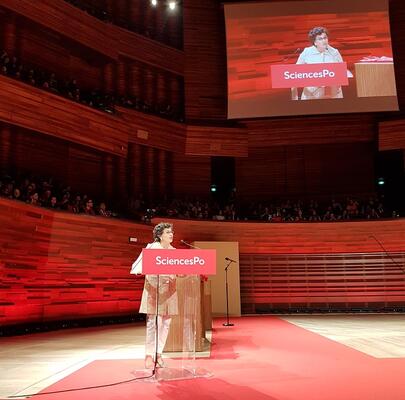
Remarks at the graduation ceremony of Sciences Po 2017
Executive Director
Paris 1 July 2017
Bonsoir
Good evening and congratulations to the graduates of 2017.
I want to thank President Frederic Mion, Dean Enrico Letta and the entire Sciences Po family for giving me the opportunity to share this important moment with you. You represent the best the world has to offer: youth, multiculturalism, openness, dynamism, knowledge.
Tomorrow you will start your walk in life, and as you do that I want to humbly offer some tips of advice.
I want to start with Simone Veil, an incredible woman, an amazing human being who has just left us. She is a symbol of the three big combats of the XX century: the fight against totalitarism, the fight for greater solidarity - in her case in Europe - and the combat for women's right. All these are unfinished business and quoting her tonight I want to pay tribute to her. But also hope that she can serve as inspiration to you as she inspired me in my student years.
Simone Veil said "the most important part of teaching is to teach what it is to know". What is knowledge in the XXI century?
Knowledge means curiosity, the ability and desire to question what surrounds us. The desire to understand what drives us as much as what motivates others.
Understanding each other requires curiosity.
Governance requires curiosity. Because governance is about building common rules, procedures, institutions and this is not possible without understanding how far the others can go. How big the differences and similarities are. During my tenure as Chief of Staff at the World Trade Organisation I understood that building a common trading system could not be done by imposing what one country wants on others, but rather by building what can work for all members.
The XXI century will be defined by the fastest ever pace of technological progress. Technology has an incredible ability to empower the poorest, the remotest, the smallest. Technology is helping to change the center of gravity of the world. Technology is re-shaping the definition of work and the generation of wealth. The jury is still out as to whether this will lead to a better global reality or to more inequality. I err on the side of positivity with the key being that we learn from what has not worked up to now to better manage this future. A more inclusive future.
The changes are already with us: robots, automation, artificial intelligence, self-driving cars. Innovation requires creativity. And what is creativity without curiosity?
But curiosity is not enough. When we don’t know, we don’t care. But once we know, we cannot but care. And this is why knowledge must mean commitment. Commitment speaks of values, of beliefs. In these turbulent times when societies are torn by wars, conflict, poverty, violence, and radicalism, you- we- must stand up for the values that unite all humans.
These values are beautifully captured in the Charter of the United Nations dating from 1945 and which are needed more than ever today.
“We the peoples of the United Nations are determined to save future generations from war
We are determined to defend fundamental human rights
We are determined to defend the dignity and worth of the human person
We are determined to defend equal rights of men and women
We are determined to promote social progress and better standards of life in larger freedom”.
These are the values that I encourage you all to exercise, to represent, to live, to foster change.
This is my third ingredient. Knowledge must lead us to change.
A first step towards change is embodied in the United Nations 2030 Agenda. A global plan to end extreme poverty by 2030 by working along seventeen areas from education, healthcare, and gender equality to climate change, access to water, peaceful societies, entrepreneurship and stronger institutions.
This is the Marshall Plan of our century. And all of you, all of us, must be the actors to achieve the goal of freeing humans from the scourge of abject poverty by 2030.
Let me for a moment pause in an area whish desperately needs our action: climate change.
We have the knowledge. We need to invest in greater commitment. We must accelerate action.
Because the planet we have is our only planet.
Because we owe it to our future generations.
Because we have the means to produce and consume in a greener manner and still make our economy work.
Just last year, a small museum in eastern Kentucky – a museum dedicated to the industry that used to power the regions’ economy – coal – decided to install solar panels in its roof. Were they confused? Were they trying to make a point? No! The move was simply motivated by a desire to reduce the electricity bill!
As I come to the end of my intervention, I encourage you to stand up for the values of the United Nations. Not because they are the UN’s values, but because they are your values as human beings.
I encourage you to act, even if it is with a small ‘a’. Because lots of small actions lead to big impact.
And to do so by relying on knowledge, on facts, on analysis.
But above all, never lose your curiosity, because when you do, you will become cynical. And as Oscar Wilde said
“A cynic is a person that knows the price of everything and the value of nothing”.
Tomorrow, or maybe Monday because I know tomorrow you will be partying, don’t walk, but run and change the world for good!
Good luck!



